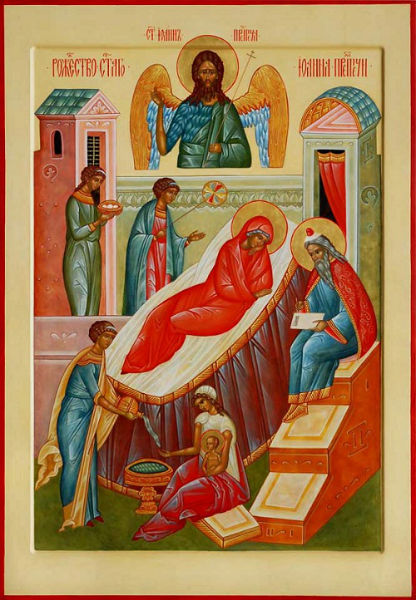Why is the Least in the Kingdom Greater than John the Baptist?
St. Luke (Voyno-Yasenetsky) of Simferopol
Today we are celebrating the Nativity of the great John, Prophet, Forerunner, and Baptist of our Lord Jesus Christ. The glorious Prophet Isaiah foretold this great event 700 years earlier: The voice of one crying in the wilderness, Prepare ye the way of the Lord, make straight the paths of our God (40:3 [LXX]).
With these words, the Prophet Isaiah foreordained the main purpose of the life of John the Forerunner and Baptist of the Lord.
Three hundred years after Isaiah, another prophet, Malachi, called John the Lord’s Forerunner an Angel [messenger] sent by the Lord to prepare the way before Him.
Our Lord Jesus Christ Himself attested to the Prophet’s words before the multitudes when John the Forerunner, then already in prison, sent two of his disciples to ask Him: Art Thou He that should come, or do we look for another? (Matthew 11:3).
Addressing the multitudes, the Lord said: But what went ye out for to see? A prophet? yea, I say unto you, and more than a prophet. For this is he, of whom it is written, Behold, I send My messenger [angel] before Thy face, which shall prepare the way before Thee. Verily I say unto you, Among them that are born of women there hath not risen a greater than John the Baptist: notwithstanding he that is least in the kingdom of heaven is greater than he (Matthew 11:9-11).
It is with great confusion that we pause before these last words of the Savior. How are we to understand that the least in the kingdom of heaven is greater than John the Forerunner, the greatest of all those born of women?
These words cannot be understood by human reason; only other words of the Lord Jesus, spoken in entirely different circumstances, can explain these words that cause us confusion: that the least in the Kingdom of Heaven is greater than the glorious Forerunner and Baptist of the Lord.
Let us recall the account, in chapter 20 of Luke’s Gospel, of how the Lord Jesus Christ was tempted by the Sadducees, Jewish sectarians who rejected belief in the resurrection of the dead.
The Sadducees told Him of a barren woman who had had seven brothers as husbands, following the Mosaic Law requiring one to take the wife of one’s brother if he dies childless, in order to raise up his seed. There were seven such brothers, all of whom died childless. The Sadducees were hoping to trap the Lord Jesus Christ by this question: Therefore in the resurrection whose wife of them is she? for seven had her to wife. And Jesus answering said unto them, The children of this world marry, and are given in marriage: But they which shall be accounted worthy to obtain that world, and the resurrection from the dead, neither marry, nor are given in marriage: Neither can they die any more: for they are equal unto the angels; and are the children of God, being the children of the resurrection (Luke 20:33-36).
Let us also recall other extraordinary words of the Lord Jesus Christ, recorded by John the Theologian in the fifth chapter of his Gospel: Verily, verily, I say unto you, He that heareth My word, and believeth on Him that sent Me, hath everlasting life, and shall not come into condemnation; but is passed from death unto life (5:24).
In these extraordinary words of the Lord Jesus, as well as in His response to the Sadducees cited above, the great mystery of the afterlife of the righteous who have been found worthy of attaining the Heavenly Kingdom is revealed to us. They are no longer subject to the temptations of the flesh. They are children of God; they are equal to the Angels; and they are already living in eternal life and cannot die. Such, too, is the very least of them.
But can we say all of this about John the Lord’s Forerunner? No, we cannot. He was less than the immortal children of God, for not only could he die, but he even bowed his holy head under the executioner’s sword.
He was not born bodiless, but bore human flesh with all its weaknesses and temptations.
He did not appear to the world as did the Archangel Gabriel or the Angels who appeared to the Myrrh-Bearing Women at the grave of the Risen Savior of the world.
If the Prophets and the Lord Jesus Christ Himself called him His Angel, this should be understood in the sense that he bore the spirit, purity, and perfection of the angels in a human body.
For his indescribable ascetic struggles in the desert; for the boundless depths of his prayer and fasting; for the great labor of preaching with which he prepared the way of the Lord; for the Baptism of the Son of God in the Jordan; for his martyric death – for all this, of course, the great Forerunner is now the first in the Kingdom of God after the Most-Holy Theotokos. But so long as he lived in the body, the least in the Heavenly Kingdom was greater than he.
To Him be glory unto the ages of ages! Amen.





